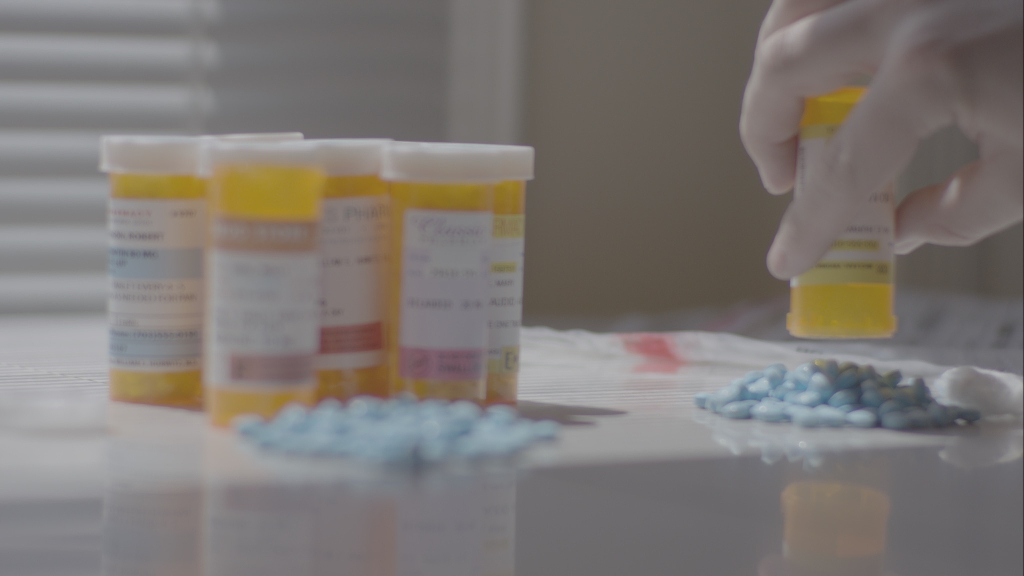Premiering at this year’s Los Angeles Film Festival – and screening the upcoming Austin Film Festival on October 15th and 19th – Dr. Feelgood: Dealer or Healer? couldn’t be making the festival rounds at a more appropriate time. Directed and produced by Eve Marson (Fed Up), the doc follows Dr. William Hurwitz, a Columbia College/Harvard/Stanford alum specializing in pain management, who in 2004 was convicted of over 50 counts of narcotics distribution – resulting in a 25-year prison sentence for drug trafficking.
As the film’s title suggests, though, the ethics inherent in prescribing opioids in the midst of a nation-wide epidemic can be complicated, to say the least. Recently, I had the opportunity to speak with Marson about Hurwitz, Big Pharma, moral dilemmas, and more prior to the film’s Texas premiere.
Lauren Wissot: So how did you first become aware of Dr. Hurwitz? And how did you convince him (and his family) to allow you to make the doc?
Eve Marson: I was interested in looking at the ethical dilemma of prescription painkillers from the perspective of the doctor. As such, I needed a story of a doctor charged with overprescribing painkillers – but I wanted one that was not clear-cut. Dr. Hurwitz’s story was particularly intriguing to me because the testimonies in this case contradict each other so sharply. Some of his patients revere him as a heroic genius, while others condemn him as a fool and a murderer. I was fortunate to be connected with Hurwitz through a personal connection through his defense lawyer, Larry Robbins. Hurwitz was very eager to speak with me and participate in the film. For him it was a chance to share his perspective and help clarify his own motives. His family was more hesitant to be back in the news, but we did our best to assure his wife and daughter that our film would be a thoughtful meditation rather than a one-sided attack.
LW: You spent a great deal of time interviewing not only Dr. Hurwitz, but also his former patients and their family members – whose opinions of him do indeed range from life-saving angel, to the angel of death. Obviously, he’s a complicated subject. What’s your own personal take on him? Did it change throughout the production process?
EM: It was always my intention to make a film that presented an ambiguous portrayal of Dr. Hurwitz. The questions arise: Is he a compassionate doctor or a reckless drug trafficker? Where do we draw the line? I wanted to show both perspectives, but never wanted the film to take a clear stance.
We were watching as the story unfolded in the news, and we tried to keep our coverage of the debate up to date. In the two years we were making this film, the numbers for drug abuse have continued to skyrocket – especially heroin use, which is largely fueled by opioid addiction. No matter what you think of Dr. Hurwitz, it became clear to me that these drugs have caused a great deal of destruction and can be very dangerous, and so it became important to include certain statistics of drug usage and abuse in the film.
LW: The film mainly focuses on Dr. Hurwitz and his legal travails, so I’m wondering if the decision not to deeply tackle the top drug kingpins – i.e., Big Pharma – was a conscious choice. Or did you not have adequate access to key industry players?
EM: My feeling was that the discussion of Big Pharma had been tackled already at length in the mainstream media and in other documentary films. While the pharmaceutical companies are absolutely a key player in the issue – and we do discuss their influence and marketing tactics in the film – I wanted to keep our primary focus here on the doctor’s dilemma. When these pills are made so available (by Big Pharma), what can doctors do to balance their desire to relieve suffering against their concern of creating addiction?
LW: Was there anyone who you really wanted to get on camera but couldn’t? Anything left on the cutting room floor that you wish you’d had the time to more fully explore?
EM: We were not able to interview Hurwitz’s prosecutor Gene Rossi as he works for the state, and that was a bummer. By speaking with him extensively off-camera, we were able to bring in the prosecution’s perspective – and Rossi also helped to introduce us to several key characters from the “other side,” including Bret who was dealing drugs prescribed by Hurwitz and ultimately testified against him in court.
LW: I noticed that you were also the lead producer on the (Sundance 2014) food industry expose Fed Up, working alongside journalist Katie Couric and the film’s director Stephanie Soechtig. That team recently made news when Couric issued an apology for the “misleading” editing on Soechtig’s latest doc Under the Gun, a study of the Sandy Hook aftermath and our gun violence epidemic. What’s your opinion about the editing controversy surrounding the film and/or Couric’s statement itself?
EM: I don’t wish to comment on this. Soechtig is a great filmmaker, and I am proud of our work on Fed Up, and commend the team’s work on Under the Gun.
Photo: Jeff Bierman

